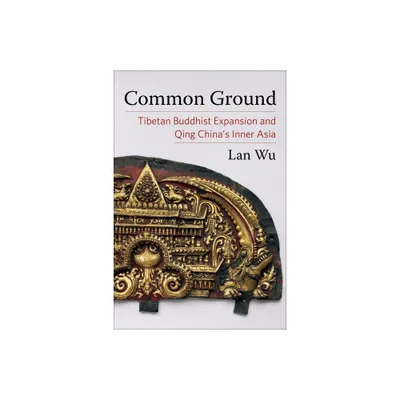Home
Common Ground
Loading Inventory...
Barnes and Noble
Common Ground
Current price: $17.99


Barnes and Noble
Common Ground
Current price: $17.99
Loading Inventory...
Size: CD
*Product Information may vary - to confirm product availability, pricing, and additional information please contact Barnes and Noble
In 2019, following their joint tour of Japan, guitarist
Robben Ford
and saxophonist/keyboardist
Bill Evans
recruited jazz bassist
James Genus
and
Steely Dan
drummer
Keith Carlock
to cut
The Sun Room
in a Nashville studio. The group is back with
Rolling Stones
' bassist
Darryl Jones
in the bass chair. Recorded in the same studio, this set's focus relies heavily on a more rockist jazz-funk and blues.
Common Ground
was co-produced by the saxophonist and
Clifford Carter
, and its nine tracks clock in at just under an hour. The session gets unruly early on with "Ever Ready Sunday," a mean, funky, jazz-rocker. Kicked off with a power chord vamp by
Ford
,
Jones
rumbles behind
Carlock
's snare and hi-hat breaks.
Evans
solos on soprano and
follows with a meandering meld of jazzy arpeggios and blues licks. "Crabshaw Don't Care" is an easy jazz-funk groover with
' alto sharing the head with guitar. The backbeat cuts deep as
' bass embellishes. "Sentimental Mode" is laid-back and breezy. Soprano sax paints the melody atop a lithe chord progression before
's lead joins with an elegant blues feel. "Hearts of Havana" begins with a series of Latin breaks from
as
bubbles underneath.
's flamenco-tinged fingerpicked chords introduce
' lyric soprano melody. Following his melodic solo,
adds a blues vamp straight that recalls the one in
Boz Scaggs
' "Payday" before delivering a gorgeous solo composed exclusively of chord shapes underscored by punch-and-roll fills from
.
' soprano break offers an abundance of harmonic ideas. German pop singer
Max Mutzke
guests on the title track. Drenched in jazzy soul, the rhythm section creates a steamy frame for the singer and a guitar solo. Single "Passaic" opens with a fingerpopping rhythm section vamp that
' tenor swings on. He and
solo, then trade fours inside the meaty, walking groove. Though "Stanley" commences as an airy jazz ballad, it is transformed by the frontline into a nasty, dynamic jazz-blues with biting guitar and sax work. "Dennis the Menace" is angular post-bop wed to knotty jazz-funk. The rhythm section's fluid interplay allows for elastic soloing from their bandmates. Closer "The Little Boxer" emerges from
's and
' riff-like interaction on the scalar melody. (The guitarist's minor vamp recalls
Neil Young
's in "Down by the River.")
interjects a wandering soprano solo, bridging keys and modes. Though its tension roils,
show restraint and exceptional taste in locking down the groove.
employs modern jazz as the ground for exceptional -- and playful -- group communication through rock, funk, and blues. The tunes offer imagination and sophistication -- as well as good vibes -- and showcase a masterful shared vocabulary that holds great possibility for future development. Here's hoping for a third installment. ~ Thom Jurek
Robben Ford
and saxophonist/keyboardist
Bill Evans
recruited jazz bassist
James Genus
and
Steely Dan
drummer
Keith Carlock
to cut
The Sun Room
in a Nashville studio. The group is back with
Rolling Stones
' bassist
Darryl Jones
in the bass chair. Recorded in the same studio, this set's focus relies heavily on a more rockist jazz-funk and blues.
Common Ground
was co-produced by the saxophonist and
Clifford Carter
, and its nine tracks clock in at just under an hour. The session gets unruly early on with "Ever Ready Sunday," a mean, funky, jazz-rocker. Kicked off with a power chord vamp by
Ford
,
Jones
rumbles behind
Carlock
's snare and hi-hat breaks.
Evans
solos on soprano and
follows with a meandering meld of jazzy arpeggios and blues licks. "Crabshaw Don't Care" is an easy jazz-funk groover with
' alto sharing the head with guitar. The backbeat cuts deep as
' bass embellishes. "Sentimental Mode" is laid-back and breezy. Soprano sax paints the melody atop a lithe chord progression before
's lead joins with an elegant blues feel. "Hearts of Havana" begins with a series of Latin breaks from
as
bubbles underneath.
's flamenco-tinged fingerpicked chords introduce
' lyric soprano melody. Following his melodic solo,
adds a blues vamp straight that recalls the one in
Boz Scaggs
' "Payday" before delivering a gorgeous solo composed exclusively of chord shapes underscored by punch-and-roll fills from
.
' soprano break offers an abundance of harmonic ideas. German pop singer
Max Mutzke
guests on the title track. Drenched in jazzy soul, the rhythm section creates a steamy frame for the singer and a guitar solo. Single "Passaic" opens with a fingerpopping rhythm section vamp that
' tenor swings on. He and
solo, then trade fours inside the meaty, walking groove. Though "Stanley" commences as an airy jazz ballad, it is transformed by the frontline into a nasty, dynamic jazz-blues with biting guitar and sax work. "Dennis the Menace" is angular post-bop wed to knotty jazz-funk. The rhythm section's fluid interplay allows for elastic soloing from their bandmates. Closer "The Little Boxer" emerges from
's and
' riff-like interaction on the scalar melody. (The guitarist's minor vamp recalls
Neil Young
's in "Down by the River.")
interjects a wandering soprano solo, bridging keys and modes. Though its tension roils,
show restraint and exceptional taste in locking down the groove.
employs modern jazz as the ground for exceptional -- and playful -- group communication through rock, funk, and blues. The tunes offer imagination and sophistication -- as well as good vibes -- and showcase a masterful shared vocabulary that holds great possibility for future development. Here's hoping for a third installment. ~ Thom Jurek


















